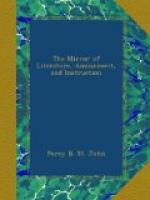O sweet woods, the delight of solitariness!
O how much do I like your solitariness.
Enough of the baronial hall at Penshurst has been spared to show the lantern for ventilation in the roof, “the original fire-hearth beneath it, with a large and-iron for sustaining the blazing log;” though of the place generally, Mr. Britton observes, “A house that has been so long deserted by its masters must exhibit various evidences of ruin and decay. Not only walls, roofs, and timbers, but the interior furniture and ornaments are assailed by moth, rust, and other destructive operations.” Alas! the fittest scene of Burke’s lament for chivalry would have been the hall of Penshurst. Yet, a Sir Philip Sydney exists, and has lately been honoured with some distinction, as Churchill would say, “flowing from the crown.” In the park at Penshurst, is, however, one of Nature’s memorials of one of her proudest sons—“a fine old oak tree, said to have been planted at Sir Philip Sydney’s birth:” and in Penshurst churchyard, on the south side of the mansion, several of the Sydneys lie sleeping. Requiescant in pace.
Hever Castle, built in the reign of Edward III., already mentioned as the residence of the Boleyns, is about four miles north-west of Penshurst.
We have left ourselves but space to mention in the vicinity of the Wells, Buckhurst and Knole, magnificent seats of the Sackvilles, Earls of Dorset, whose splendid details have already filled volumes. Lastly, we promise the Wells visiter some gratification, by extending his tour to Brambletye House, memorialized in Horace Smith’s entertaining novel. These few traits may serve to show the picturesqueness of the environs of the Wells, and consequently of Mr. Britton’s volume; and we leave the reader with their grateful impression on his memory.
* * * * *
SPIRIT OF THE PUBLIC JOURNALS.
* * * * *
TO CAROLINE, VISCOUNTESS VALLETORT.
WRITTEN AT LACOCK ABBEY, JANUARY, 1832.
By Thomas Moore, Esq.
When I would sing thy beauty’s light,
Such various forms, and all so bright,
I’ve seen thee, from thy childhood,
wear,
I know not which to call most fair,
Nor ’mong the countless charms that
spring
For ever round thee, which to sing.




